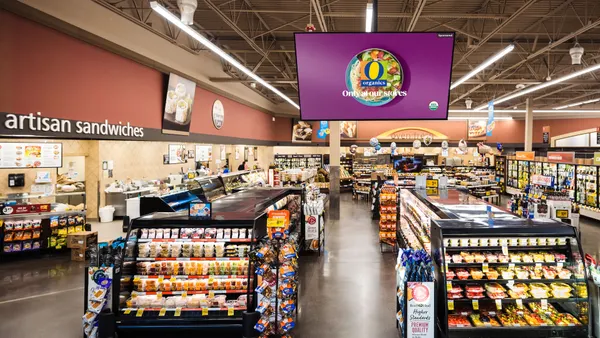Brief:
- Smart-speaker ownership surged 36% to 53 million U.S. people ages 18 and older, according to a survey from National Public Radio (NPR) and Edison Research. About 21% of U.S. adults said they owned a smart speaker, such as an Amazon Echo, Google Home or Apple HomePod.
- Many consumers now own more than one smart-speaker device. The percentage of smart-speaker owners who said they owned three or more devices rose to 30% in 2018 from 17% a year earlier, the survey found. That led to a 78% jump in the number of smart speakers in U.S. households to 118.5 million in December from 66.7 million a year earlier. Eight percent of U.S. adults got a smart speaker during the holiday season.
- About a third (29%) of smart speaker owners who responded to the survey said they use their smart speaker several times a day, while 24% use the devices nearly every day. Three-fourths (77%) of U.S. adults were aware of smart speakers in December, little changed from 75% a year earlier, the study found.
Insight:
NPR’s survey confirms other studies that show the growing popularity of smart speakers that are a key part of the connected home. The 21% ownership level suggests the market has plenty of room to grow before reaching saturation. The voice-powered devices are rapidly expanding their range of functions as software developers create thousands of apps for virtual assistants that listen and respond to spoken commands. Amazon, the current market leader in smart speakers, will see its share of the market drop to 63% this year from 67% in 2018 as the e-commerce giant faces more competition from Google and other companies, researcher eMarketer forecast.
Amazon Alexa, the virtual assistant that runs on Echo speakers, a mobile app and some connected cars, is integrated with more than 100 million other devices, the Verge reported this month. More than 150 products have Alexa built in, while more than 28,000 smart-home devices made by more than 4,500 different manufacturers work with Alexa, which has more than 70,000 "skills," as apps for the platform are called. Amazon this week hired Disney Senior Vice President Kyle Laughlin to run its Alexa Gadgets division that connects Echo devices with Bluetooth, TechCrunch reported.
Google Assistant, which works on the Google Home line of smart speakers and displays, is integrated with more than 1,600 home-automation brands and more than 10,000 devices, according to a Google blog. The mobile apps for Google Assistant will help to extend its reach by the end of this month to 1 billion devices, or 10 times Alexa's install base. But Google Assistant actually doesn't have that many active users, as Ars Technica reports. In other words, Google Assistant is winning the platform war on mobile phones but still lags behind Alexa in the smart-home market, per Search Engine Journal.
Google expanded Assistant’s capability to work with Google Maps for Android and iOS, per Google's blog. The digital assistant in the next few weeks will add translation services for dozens of languages, helping people to have conversations with when they travel to foreign countries. Google is piloting the Interpreter Mode at the Consumer Electronics Show (CES) concierge desk in Caesars Palace in Las Vegas, and at the Hyatt Regency in San Francisco and Dream Downtown in New York City. Google also previewed its Google Assistant Connect, a platform for device manufacturers to integrate the digital assistant into their products.









